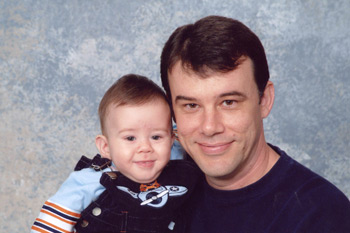
INFANCY: 6 Month Visit
Getting Ready for this Visit
 Write down your questions. Share your baby's new accomplishments and fully participate in this visit as a partner in your child's health.
Write down your questions. Share your baby's new accomplishments and fully participate in this visit as a partner in your child's health.
Children with special needs: Discuss how things are going for you and your child—any concerns, needs, or support services. If your baby is in Early Intervention, bring your Individualized Family Service Plan (IFSP) to the visit, mention treatments or visits to specialists.
At this age, your baby may:
- Recognize faces; respond to name
- Learn to roll over; sit
- Move small objects from hand to hand; put things in mouth
- Have a first tooth
- Begin to laugh, squeal, imitate sounds
- Enjoy "talking" and smiling with parents and familiar people
- Try to feed herself
What's Important for this Visit
YOUR questions and concerns are the #1 priority! Your health care provider may also discuss:
-
Family: balancing parent roles; parent support; child care
-
Infant development: parents as teachers; learning and playtime; communication (babbling, responding to and participating with others); children with special needs; beginning infant independence; sleep routine and safety
-
Feeding routines: feeding strategies (when, how much); feeding choices (readiness for solid food, choices of fluids); breastfeeding or formula feeding
-
Oral health: fluoride; gum and mouth care/clean cloth or toothbrush; avoiding bottle in bed
-
Safety: car seats; avoiding falls, walkers, lead poisoning, drowning; safe water temperature; burns; choking
The Six Month Visit: What To Expect
Your health care provider will check your baby from head to toe, checking skin, head, eyes, heart, etc.; measure height, weight, and head size; ask questions to see how your child is developing, and ask about changes in your family. Carry out screening tests: oral health, others as needed.
- Immunizations: See chart for any needed at this age.